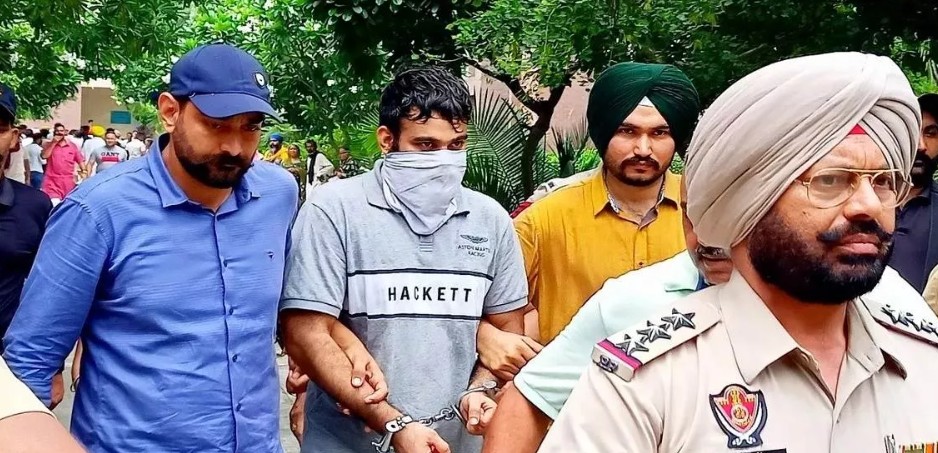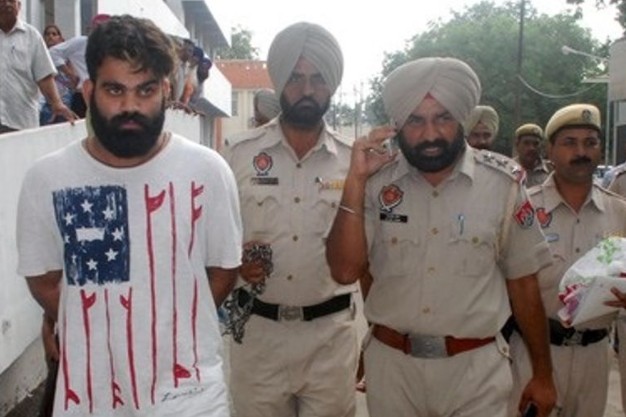In a significant move against organized crime and the growing drug menace, the Narcotics Control Bureau (NCB) has detained Punjab-based gangster Deepak Tinu Bhagwanpuria under the Prevention of Illicit Traffic in Narcotic Drugs and Psychotropic Substances (PIT-NDPS) Act. The gangster, known for his involvement in multiple criminal activities, including drug trafficking, extortion, and contract killings, has been transferred to a high-security prison in Assam. His detention marks a crucial step in the authorities’ ongoing efforts to dismantle organized crime networks operating across multiple states.
The Rise of Bhagwanpuria and His Criminal Network
Bhagwanpuria, originally hailing from Punjab, has long been on the radar of law enforcement agencies due to his involvement in various illicit activities. Over the years, he built a notorious reputation as one of the most feared criminals in the region. His gang, active in Punjab and neighboring states, has been linked to multiple high-profile crimes, including smuggling of narcotics, targeted killings, and arms trafficking. Authorities believe that he played a pivotal role in running a cross-border drug syndicate, working in collaboration with international smugglers and local suppliers.
Despite multiple arrests in the past, Bhagwanpuria continued to operate his criminal empire from inside prison, using intermediaries and associates to execute his plans. His ability to command his network even while being incarcerated raised concerns among law enforcement agencies, prompting stricter measures against him.

Crackdown on the Drug Mafia in Punjab
The Punjab government and central agencies have been actively cracking down on drug trafficking and organized crime, recognizing the severe impact of narcotics on the youth and society at large. Punjab has been one of the worst-affected states in India in terms of drug abuse, with a large percentage of the population, particularly young people, struggling with addiction. The smuggling of heroin and synthetic drugs through the Indo-Pak border has remained a major challenge, and gangsters like Bhagwanpuria have been key players in this illicit trade.
Recent intelligence reports suggested that Bhagwanpuria’s gang was actively engaged in supplying drugs across multiple districts, laundering money through fake businesses, and using violence to eliminate rivals. This prompted the authorities to invoke the PIT-NDPS Act, a stringent law that allows preventive detention of individuals suspected of engaging in illicit drug trafficking.
Why Was Bhagwanpuria Sent to an Assam Jail?
Given Bhagwanpuria’s strong connections in Punjab and his ability to influence local prison authorities, the decision was made to transfer him to Dibrugarh Jail in Assam, a high-security facility where other high-profile criminals and separatist leaders have been detained in the past. The move is intended to sever his connections with his Punjab-based network and prevent any possibility of him continuing his illegal activities from within the jail.
Authorities have often struggled to contain the influence of gangsters lodged in Punjab prisons, as many of them manage to operate their criminal enterprises through smuggled mobile phones, corrupt officials, and accomplices who carry out their orders. By moving Bhagwanpuria to Assam, law enforcement agencies aim to neutralize his influence and prevent him from coordinating illegal activities.
Previous Criminal Records and Gang Rivalries
Bhagwanpuria’s criminal record is extensive, with multiple cases of murder, kidnapping, extortion, and drug smuggling registered against him. He has been associated with several contract killings in Punjab, including those of rival gang members and businessmen who refused to pay extortion money.
His gang has also been involved in inter-gang rivalries, particularly with factions led by Lawrence Bishnoi and Jaggu Bhagwanpuria (not related to Deepak Tinu). These gang rivalries have led to violent shootouts and assassinations, creating a climate of fear in Punjab.
The authorities believe that curbing the influence of such gangsters is crucial for restoring law and order in the state. Over the past year, multiple gang members and drug traffickers linked to Bhagwanpuria have been arrested, and significant quantities of drugs and firearms have been seized.
Implications of the Detention and Next Steps
Bhagwanpuria’s detention under the PIT-NDPS Act is a major victory for law enforcement agencies, as it ensures that he remains in custody without the possibility of immediate bail. Under the provisions of this act, authorities can detain an individual for up to one year without trial, allowing ample time for investigations and further action.
The next steps in the legal proceedings will involve a thorough investigation into his financial dealings, sources of narcotics supply, and links to international smugglers. Authorities are also expected to tighten security measures in Punjab’s prisons to prevent other gangsters from continuing their operations from inside jail.
Additionally, the government is working on strengthening border security measures, including deploying advanced surveillance systems and increasing patrols along the international border to prevent drug smuggling. Intelligence-sharing between different law enforcement agencies is also being enhanced to dismantle the networks that support organized crime in the region.
Public and Political Reactions
The crackdown on Bhagwanpuria has been welcomed by the public, especially in Punjab, where the drug menace has destroyed many lives. Families of drug abuse victims and social activists have long been demanding stronger action against drug lords and their associates. Many believe that neutralizing powerful criminals like Bhagwanpuria is necessary to break the cycle of drug addiction and crime in the state.
However, some opposition leaders and human rights activists have raised concerns over the use of preventive detention laws, arguing that such measures should be applied judiciously to prevent misuse. They have called for a transparent legal process to ensure that only individuals genuinely involved in organized crime face strict action.
Despite these debates, the overall sentiment remains in favor of strong measures to curb drug trafficking and gang violence. The Punjab government has reiterated its commitment to tackling the drug problem, emphasizing that more arrests and crackdowns will follow to completely eliminate the nexus between gangsters and narcotics suppliers.
The detention of Bhagwanpuria under the PIT-NDPS Act and his transfer to Assam’s high-security jail mark a decisive step in the fight against organized crime and drug trafficking in Punjab. As law enforcement agencies continue their efforts to dismantle his network, the move serves as a warning to other criminals involved in similar activities.
While the fight against drug-related crime is far from over, this development signals the government’s determination to restore law and order in Punjab. With increased vigilance, better intelligence-sharing, and stricter enforcement of laws, authorities hope to curb the influence of gangsters and drug mafias that have long plagued the state.


